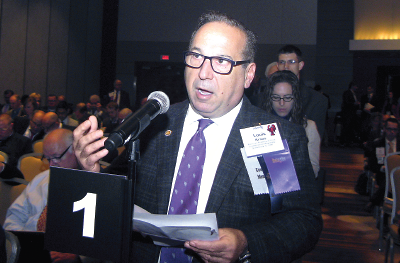Nonmedical exemptions from immunization—based on religious, philosophical, or personal beliefs—endanger the health of the unvaccinated individual and the health of those in an individual’s group and the community at large.
That was the conclusion of a report by the AMA Council on Science and Public Health (CSPH) titled “Nonmedical Exemptions to Vaccination,” which had close to unanimous approval by the AMA House of Delegates at its Interim Meeting in Atlanta last month. Delegates also acted on reports and resolutions related to insurance-industry consolidation, health and mental health services for incarcerated individuals, electronic health records (EHRs), public access to clinical-trial data, and availability of prescription drugs to address the opioid epidemic and treat opioid overdose.
The CSPH report on vaccines was a follow-up to a joint report on the same subject by CSPH and the Council on Ethical and Judicial Affairs (CEJA) that was not approved at the June meeting of the House this year but rather was referred to the AMA Board of Trustees. The report’s conclusions were divided: the CSPH asserted the public health benefits and safety of vaccinations, while CEJA maintained that there existed an ethical obligation to preserve some degree of parental discretion in whether children should be vaccinated (
Psychiatric News, July 17).
“Nonmedical exemptions should protect individuals’ right to make choices about what happens to their bodies or to their children’s bodies,” CEJA wrote. “Public policies [should] limit nonmedical exemptions to circumstances in which refusals are based on well-considered, deeply held beliefs and require individuals who seek exemptions to demonstrate that they meet those criteria.”
The CSPH report issued last month focused exclusively on the science related to immunization—benefits and risks to individuals and the community associated with vaccines and with the failure to immunize. “The science in support of universal immunization is clear and compelling,” said David Fassler, M.D., alternate delegate from the American Academy of Child and Adolescent Psychiatry, during testimony on the report. “As physicians, we have an obligation to help translate the public health data and research findings for our patients, for legislators, and for public health advocates and policymakers.
“Our support for immunization, except when medically contraindicated, should be consistent and unambiguous,” he said. “Our collective advocacy on this issue will help protect our patients and the general public.”
The council’s vaccine report calls for the development and dissemination of evidence-based public awareness campaigns aimed at increasing vaccination rates, encourages the development of educational materials for patients and families clearly articulating the benefits and safety of vaccines, and encourages physicians and state and local medical associations to work with public health officials to inform those who object to immunizations about the benefits of vaccines and the risks to their own health and to the community if they resist them.
In light of recently proposed mergers among four of the nation’s largest health insurance companies, delegates at the meeting also adopted a policy aimed at ensuring access to care in a consolidating market with diminishing choice.
“The AMA strongly opposes mergers that would erode competition and result in patients and employers paying higher premiums and force physicians to accept unfair terms,” said Barbara McAneny, M.D., immediate past chair of the AMA’s Board of Trustees. “We urge the federal government to prohibit any mergers that would limit patient choice in selecting health insurance plans to meet their care needs or impede physicians from providing their patients with the quality care they deserve.”
The Board report titled “Insurance Consolidation” directs the AMA to “study the potential effects of monopolistic activity by health care entities that may have a majority of market share in a region on the patient-doctor relationship.” The report also calls on the AMA to “develop an action plan for legislative and regulatory advocacy to achieve more vigorous application of antitrust laws to protect physician practices confronted with potentially monopolistic activity by health care entities.”
Prior to the Interim Meeting, the AMA issued a letter to the Department of Justice calling on the agency to block Aetna’s proposed acquisition of Humana and Anthem’s proposed acquisition of Cigna due to the negative impact such mergers could pose for patients and the physicians who care for them.
The House of Delegates acted on these issues as well:
•
Health and mental health care for the incarcerated: Delegates approved a resolution to have the AMA study the provision of health and mental health care for incarcerated individuals and identify best models for local, state, and federal facilities to overcome the multiple barriers to access. Child psychiatrist Louis Kraus, M.D., delegate from the Academy of Child and Adolescent Psychiatry, argued in the House for the inclusion of mental health services—missing in the original resolution. The proposal was adopted without opposition.
•
Availability of prescription drugs to treat opioid overdose: The House approved a resolution calling on the AMA to study ways to make naloxone more accessible (after the House meeting, the FDA approved a nasal spray version of naloxone; see page 19). Delegates also approved a resolution supporting the FDA’s efforts to evaluate the efficacy, safety, and labeling of opioid abuse-deterrent technology and opposing barriers to appropriate access to and coverage of prescription drugs with opioid abuse-deterrent properties.
•
Electronic health records (EHRs)and meaningful use penalties: The House voted to direct the AMA to work to accelerate development and adoption of universal, enforceable EHR interoperability standards for all vendors before the implementation of penalties associated with the Medicare Incentive-Based Payment System. Delegates also voted to have the AMA seek exemptions from meaningful use penalties due to the lack of interoperability or decertified EHRs and to advocate for the suspension of all meaningful use penalties by insurers, both public and private.
•
Public access to clinical-trial data: Delegates voted to support the timely dissemination of clinical-trial data for public accessibility as permitted by research design and/or regulatory protocol and support the promotion of improved data sharing as well as enforcement of deadlines for submitting results from clinical research studies. ■
Reports and resolutions from the AMA Interim Meeting can be accessed
here.

